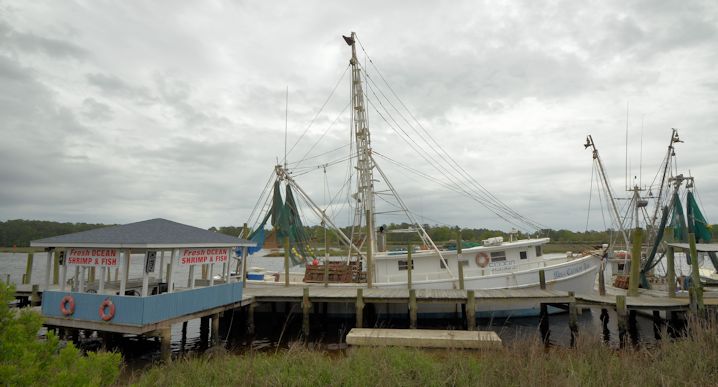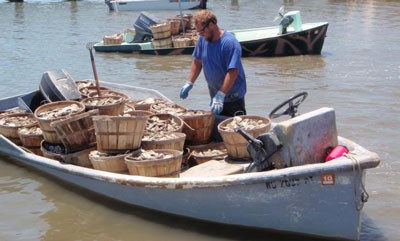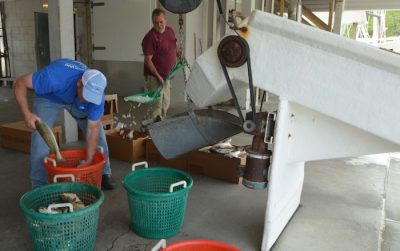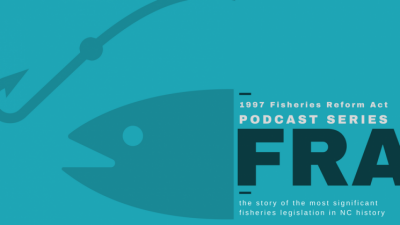
WASHINGTON – A summit recognizing the 20th anniversary this year of the Fisheries Reform Act is set to revisit the creation of North Carolina’s first comprehensive fisheries management law.
Hosted by the nonprofit Outer Banks Catch, the summit is scheduled for 10 a.m. to 3 p.m. Wednesday, Sept. 27, at the Washington Civic Center in Beaufort County. Coffee and donuts will be served at 9:30 a.m. and a light lunch will be provided. Registration is required. The fee is $10.
Supporter Spotlight
With several recent environmental bills in the General Assembly that would dramatically affect fisheries in North Carolina, organizers are using the 20th anniversary as an opportunity to put the Fisheries Reform Act in context, explain what was originally in the act, how the changes to the act have impacted fisheries and how the future may shape the FRA.

Gov. James B. Hunt Jr. signed the Fisheries Reform Act into law Aug. 14, 1997, wrapping up a three-year process of meetings, discussions and debates on the future of fisheries management in the state, according to the North Carolina of Department of Environmental Quality website.
Momentum began when the General Assembly put a moratorium on the sale of most state commercial fishing licenses effective July 1, 1994. A moratorium steering committee was appointed to study the state’s coastal fisheries management process and to recommend changes to improve the system, meeting from November 1994 to October 1996, the final report for the moratorium stated. The reform package was created by legislators, commercial and recreational fishermen, scientists, fisheries managers and conservationists, with the goal to ensure healthy stocks, the recovery of depleted stocks and the best use of fisheries resources, stated the DEQ website.
During the summit Wednesday, there will be a range of panelists with varied expertise and connections to the act, some of whom were on the moratorium committee.
Sandy Semans Ross, president of Outer Banks Catch, told Coastal Review Online that part of the nonprofit organization’s mission is to provide education about fisheries so that the public and legislators can make fact-based decisions.
Supporter Spotlight
“We have worked hard to bring in speakers who have firsthand knowledge of why and how the Fisheries Reform Act was written and implemented and the Emerging Issues panel of scientists will talk about topics that weren’t addressed at the time because they weren’t on anyone’s radar – a perfect example is rising water temperatures changing migration patterns,” she said. “We think we have put together a solid program that will interest the general public, legislators, environmentalists and both recreation and commercial fishermen.”
The first three panels will address the following questions:
- Why was fisheries reform needed?
- How were the recommendations that were the basis for the Fisheries Reform Act developed?
- How were the new laws implemented?
The last two panels of the day will focus on Emerging Issues, which will consider new areas of concern fisheries are facing, and Does the Fisheries Reform need to be tweaked, if so, why or why not?

North Carolina Coastal Federation Director Todd Miller is set to moderate the discussions. After each panel’s presentation, there will be a question and answer period. Questions will need to be submitted in writing.
Organizers provided the list of panelists that include but are not limited to the following:
- Bob Lucas: Selma attorney and recreational fisherman who chaired the Marine Fisheries Commission (MFC) and the Moratorium Steering Committee that hammered out the recommendations that were the basis of the Fisheries Reform Act.
- B.J. Copeland: Fisheries scientist and former Sea Grant executive director who served on the Moratorium Steering Committee and was a MFC member, now retired.
- Jimmy Johnson: MFC chairman during implementation who is a former commercial crab house owner and dealer and is now the Albemarle-Pamlico National Estuary Partnership’s coastal habitats coordinator for implementation of the Coastal Habitat Protection Plan mandated by the Fisheries Reform Act.
- Jess Hawkins: Marine biologist, Division of Marine Fisheries staff liaison for the MFC during creation and implementation of the Fisheries Reform Act, who later served as MFC member and is now owner and operator of Crystal Coast Ecotours.
- Susan West: Commercial fishing activist and writer who served on the Moratorium Steering Committee.
- Bob Lane: Commercial fisherman and owner of Capt. Bob’s Seafood restaurant in Hertford.
- Bill Gorham: Recreational fisherman, owner of Bowed Lures, South Atlantic Fisheries Management Council’s Cobia Sub Panel and Citizen Science Advisory Panel.
- Anne Deaton: Habitat assessment coordinator of the Division of Marine Fisheries Habitat Enhancement and Protection Section.
- Joel Fodrie: Fisheries ecologist and associate professor at the University of North Carolina Institute of Marine Sciences in Morehead City.
- Sara Mirabilo: Marine scientist and fisheries extension specialist with the North Carolina Sea Grant program.
- Wilson Laney: Senior biologist, Fisheries/Ecological Services at U.S. Fish and Wildlife Service Raleigh and adjunct assistant professor, N.C. State University’s Department of Applied Ecology.
In addition, North Carolina Sea Grant, North Carolina Division of Marine Fisheries and the Albemarle-Pamlico National Estuary Partnership will provide exhibits and information about water quality and habitat and commercial fishing gear.
West explained that she was appointed to the North Carolina Fisheries Moratorium Steering Committee. The committee reviewed the fisheries management process in North Carolina and issued the report with recommendations on ways management could be improved that formed the backbone of the FRA.
At the time of her appointment, she was president of a women-led group that advocated for commercial fishing families on Hatteras and Ocracoke islands.

West also played a major role as the principal investigator for the Fisheries Reform Act oral history project, “The 1997 NC Fisheries Reform Act: An Oral History Perspective.” In 2016, 13 oral history interviews were conducted with fishermen, scientists, environmental advocates and resource managers instrumental in crafting and implementing the act, according to the website. The oral history project was funded by North Carolina Sea Grant’s Community Collaborative Research Grants program, a partnership with the William R. Kenan Jr. Institute for Engineering, Technology and Science based at North Carolina State University. The interview recordings and transcriptions are available online on the Carolina Coastal Voices and the National Oceanic and Atmospheric Administration’s Voices from the Fisheries websites.
“I developed the proposal and assembled a team of strong collaborators with skills in coastal ecosystems management, oral history, and audio recording that executed the project, conducting oral history interviews and creating podcasts that tell the Fisheries Reform Act story,” West said.
West added that the Fisheries Reform Act created a transparent and orderly process to what had been a chaotic system for managing fisheries. That process was based on the idea that an inclusive, collaborative approach that supports the exchange of information between regulators, scientists, and stakeholders results in wise resource management.
“The oral history interviews support a deeper, more accurate picture of the past by augmenting information provided in public records. The material in the interviews digs deep into why and how policy developed. The lessons in those first-hand accounts are applicable today,” she said.
There are three podcasts in the series: “Part One: Troubled Waters” examines the state of fisheries in North Carolina prior to the moratorium on the sale of commercial fishing licenses; “Part Two: Fishing As Religion” explores the path from the moratorium to passage of the act; and “Part Three: Hindsight is 20/20” looks at the successes and shortcomings of the act.







